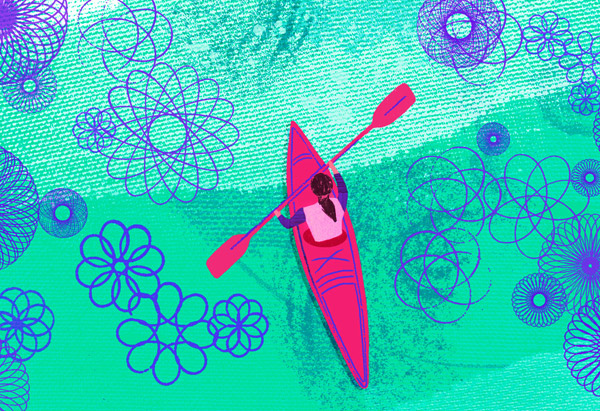The Information Superflood: Stay Afloat In A Sea of Texts, Tweets, and E-Mails

Illustration by David Pohl
Is your life on track? Not so long ago, this question seemed eminently sensible. Everyone was trying to get on track, stay on track, move further down the track. We all chugged along like Thomas the Tank Engine, making scheduled station stops (schools, corporations, banks) to pick up the usual cargo (education, job, house) and passengers (friends, spouses, children). A divorce, illness, or job loss constituted catastrophic derailment. Everyone's goal was to claim, "You betcha, my life's on track!"
Today that answer makes no sense. Because, honey, there is no track. Not anymore. We're living through the most dramatic era of change in human history. A flood of new technologies and accompanying social transitions has altered everything. It's not just that we're on the receiving end of a torrent of messages, texts, and e-mails. The way we interact and build relationships has been turned upside down; whole careers and industries have been swept away. There's so much to do, to know, to learn, to master—and the floodwaters are rising.
To negotiate this new normal, we don't need locomotives.
We need kayaks.
Now, it's not easy, letting go of the chugga-chugga, iron-engine mind-set. Kayaking, after all, is much less stable than riding a train, but these days, that's a huge advantage. This new approach allows you to go with the flow of change, turn quickly in any direction to avoid danger or pursue opportunity, pop upright again after you've gone under entirely (try doing that on a train).
Once you've learned a few paddling skills, you'll find that your nimble craft can ride the tide of change, accessing all sorts of interesting places and things no train could ever reach.
Paddling Skill #1: Don't Swallow the River
I've noticed that people who are still in train-track mode try to handle every demand or request that reaches them. That's like trying to drink the Nile. You just can't do everything. You shouldn't try. When your to-do list threatens to spill over, examine every item on it while asking two questions:
1. Is this task absolutely necessary to keep my life afloat?
2. Does this task buoy me up emotionally?
If the answer to either of these questions is yes, do the deed. If not, do nothing. Let that problem or opportunity float past you. Wave and smile, if you like, but don't bring inessential, unpleasant things on board. Your kayak isn't big enough. Anything unnecessary could sink you.
Right now my various mailboxes—voice, paper, and electronic—contain about 120 messages waiting to be answered. Today, about 15 of those messages—ten from work, five from loved ones—are essential to keep my professional and personal life from sinking. A couple more are from funny friends; they'll make me laugh. I'll get to those 17 messages today. The others, later. Maybe. I've found that important messages tend to bob along beside me, bonking against my kayak, until I get to them.
Each day, ask those two river-runner's questions about every request or assignment you encounter. Do the things that are absolutely necessary or make you happy. Let everything else drift away. If you overlook something important, you can always paddle over to it later, or snag something similar floating by. That's one of the joys of the crazy, fluid world we've created.
Next: Paddling skill #2: Find your water tribe



